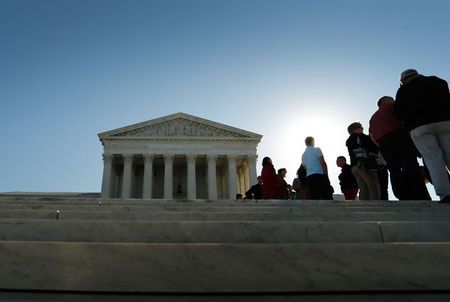By Lawrence Hurley
WASHINGTON (Reuters) - The U.S. Supreme Court appeared divided on Wednesday over whether companies must pay workers for time spent undergoing security checks at the end of their shifts in a case involving an Amazon.com Inc warehousing contractor.
Employees of Integrity Staffing Solutions facilities in Nevada, where merchandise is processed and shipped, say they are forced to spend up to half an hour daily going through security screenings aimed at protecting against theft. They say they should be paid for their time and have asked for back wages and overtime pay.
During Wednesday's oral argument in the closely watched employment law case, there were justices on the nine-member court who signaled support for one side or another and some who gave little sign of how they would vote.
Several of the court's conservatives, including Justice Antonin Scalia, appeared skeptical that the screening process was a "principal activity" of the workers' jobs under the Fair Labor Standards Act and therefore subject to compensation.
Under Supreme Court precedent, employees are paid if the work in question is "integral and indispensable" to the principal activity.
"No one's principal activity is going through security screening," added Chief Justice John Roberts.
President Barack Obama's administration has backed the warehousing company's position. Both the company and the government argue the checks are not central to warehouse work and instead are more like waiting in line to punch a time clock, an activity some courts have found does not require compensation.
The workers' strongest advocate on the bench was liberal Justice Elena Kagan. She asked whether the security checks are similar to the checking-out process bank tellers and cashiers have to go through at the end of their shifts.
Workers would likely have a strong argument if they sued in those instances, she said.
"What's the difference between that case and going through security at Amazon?" Kagan asked Integrity Staffing's lawyer, Paul Clement.
Clement conceded that Kagan's examples would constitute a "close question." But he said the Integrity Staffing case is different because the screenings are part of the process workers go through after their work has ended and they are leaving the building.
In April, the 9th U.S. Circuit Court of Appeals found the screenings were an integral part of the warehousing job done for the benefit of the employer and should be compensated.
Amazon, the world's largest online retailer, is not directly involved in the suit. But a business group called the Retail Litigation Center, in a brief supporting the warehousing company, said the industry in general loses $16 billion annually in thefts.
A ruling is due by June.

The case is Integrity Staffing Solutions, Inc v. Jesse Busk and Laurie Castro, U.S. Supreme Court, No. 13-433.
(Reporting by Lawrence Hurley; Additional reporting by Mica Rosenberg; Editing by Will Dunham)
